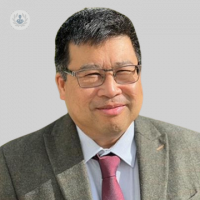How to manage constipation
Escrito por:
Constipation is a common digestive issue. However, while occasional constipation is usually nothing to worry about, more persistent cases can lead to a diminished quality of life and in a few cases can progress to more serious health concerns.
Dr Andy Li, esteemed consultant gastroenterologist, briefly explores the causes of constipation, its symptoms, and effective management strategies to help you regain digestive health.

What is constipation?
Constipation occurs when the bowels become less active, resulting in fewer than three bowel movements per week. The stools may become hard and dry, making them painful or difficult to pass. While everyone’s body is different, most people will experience constipation at some point in their lives. Additionally, symptoms may also involve abdominal pain, bloating, and a feeling of incomplete evacuation after a bowel movement.
What could be the underlying causes of my constipation?
Constipation can arise from various factors. The most common causes include:
- Dietary habits: A diet low in fibre, insufficient hydration, and foods high in fat and sugar can lead to the condition.
- Medical conditions: Conditions such as irritable bowel syndrome (IBS), hypothyroidism, diabetes, and neurological disorders can affect bowel function, causing or worsening constipation.
- Medications: Certain medications such as opioids, antidepressants, and some antihistamines can lead to constipation as a side effect.
In some cases, constipation can signal a more serious condition, such as bowel obstruction, colorectal cancer, or anatomical abnormalities. If constipation persists or is accompanied by other alarming symptoms like weight loss, blood in the stool, or severe abdominal pain, seeking medical attention is crucial.
How is constipation managed and treated?
Increasing fibre intake is often suggested as an effective treatment strategy for constipation and for many patients this is true. Fibre rich foods can support regular bowel movements by adding bulk to the stool but often it is important to consider the type of dietary fibre eaten to achieve this. Unfortunately, insoluble fibre can promote intestinal gas and bloating and this is commonly found in the skins and husks of seeds, grains, vegetables and fruit. Bran, wholemeal bread, beans, peas, brussel sprouts and nuts are other examples of foods rich in insoluble fibre. If abdominal bloating is present, then limiting dietary fibre intake to the ingestion of soluble fibre such as found in the soft flesh of fruit, pulses and cooked skinless or peeled vegetables can be very helpful. Other sources of soluble fibre include oats, hummus, white bread and pasta. Thoroughly cooking fruit and vegetables rich in insoluble fibre can make some of the fibre more soluble and allow more dietary variety.
Staying well-hydrated is equally important, as water assists in softening stool, making it easier to pass.
Physical activity is another critical component in managing constipation, as regular exercise can stimulate intestinal function and help alleviate symptoms. Engaging in moderate exercise, such as walking or swimming, for at least 30 minutes most days can make bowel movements easier.
In cases where dietary and lifestyle changes are insufficient, over-the-counter treatments may be recommended. These include fibre supplements, stool softeners, and other laxatives. However, these should be used short-term.
If lifestyle changes and over-the counter treatments don’t provide relief, your gastroenterologist may recommend further investigations to rule out any serious underlying conditions. This could involve blood tests, imaging studies, or an endoscopic procedure. In some cases, medications specifically designed to treat constipation, such as prescription laxatives or prokinetic agents, may be necessary.
For people with pelvic floor dysfunction - a condition where the muscles responsible for bowel movements don’t work correctly - further tailored investigation may be recommended to establish any anatomical or functional defect and to distinguish this issue from constipation originating from higher up in the bowel. Treatments such as pelvic physiotherapy and biofeedback could be considered.
Ultimately, the management of constipation should be adapted to each patient's specific situation. Consulting with a specialist, such as a gastroenterologist, will help monitor progress and adjust treatment plans as necessary.
If you would like to book an appointment with Dr Andy Li, head on over to his Top Doctors profile today.


